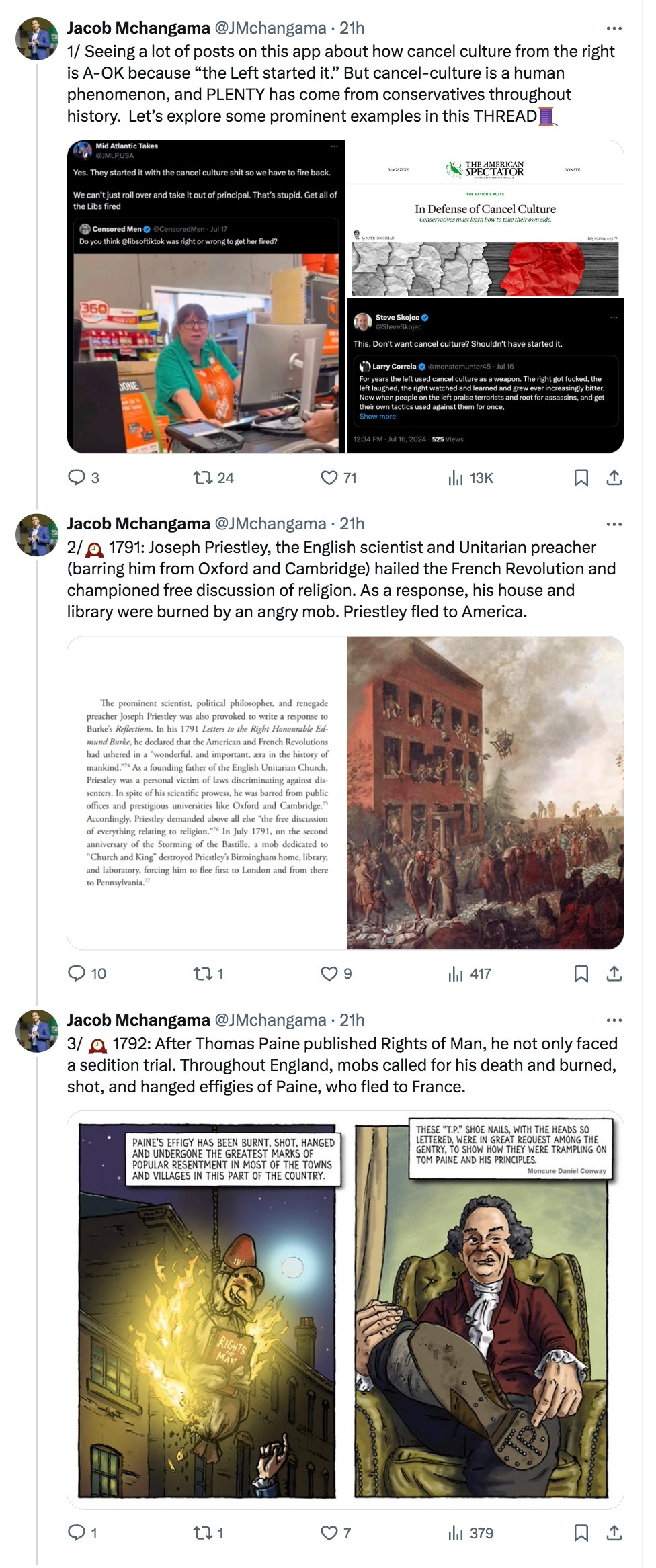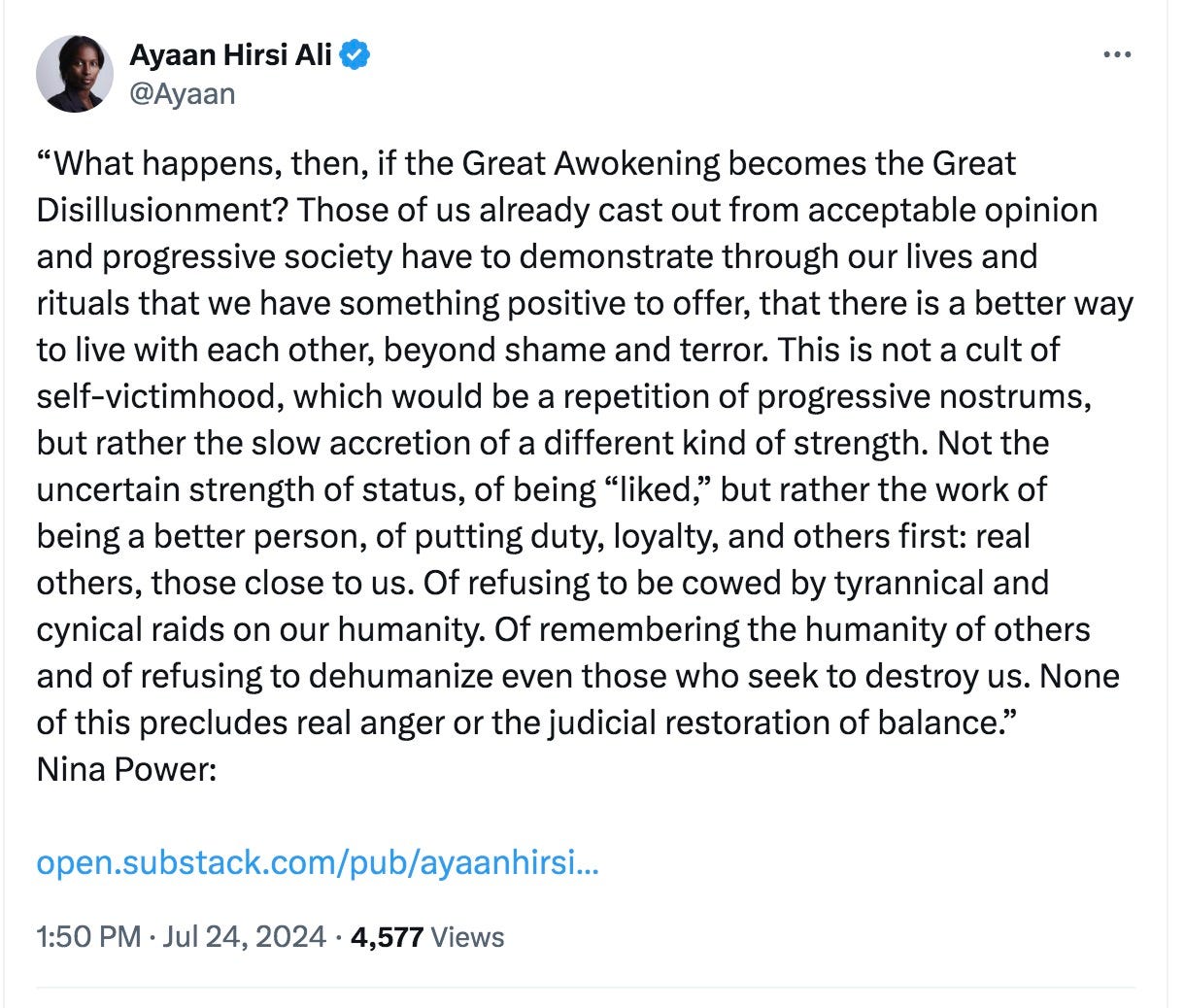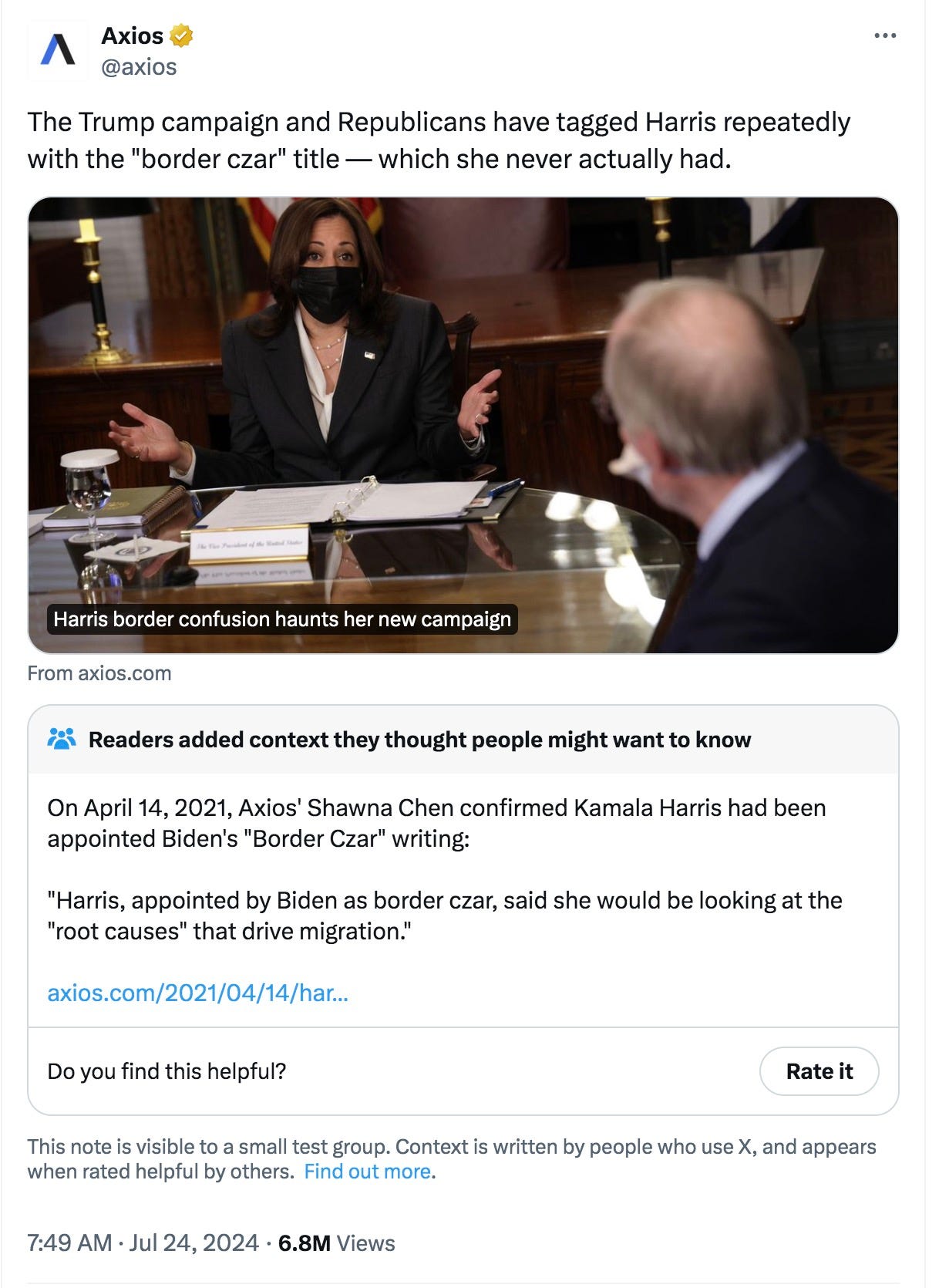A round-up of the latest and best musings on the rise of illiberalism in the public discourse:
Fred Bauer: The Politics of Crisis
Democrat Rahm Emanuel is widely credited with saying, “You never let a serious crisis go to waste.” Politicians of both parties have heeded his advice, but Fred Bauer (City Journal) writes that pushing the crisis mentality is a two-edged sword. Bauer says, as recent events demonstrate, the Biden administration has been hoist with its own petard.
By embracing the cultural politics of the Democratic Party’s new base—upper-income, college-degree holders—Biden’s administration slighted the values of working-class Americans. This also had implications for his governing style. As policy analyst Tanner Greer recently observed, Democratic leaders are often constrained by the demands of various constituent groups, which act as coalitional stakeholders. Biden’s presidency, perhaps partly because of his advanced age, represented the apotheosis of that approach. Reporting from the Wall Street Journal presented a picture of the president as removed from close interaction with congressional Democrats and even Cabinet officials. According to CNN, Biden has not met with the full Cabinet since October of last year, and what Cabinet meetings he does attend are basically pre-scripted affairs.
The Biden administration’s dissipation into these competing coalitions raised major institutional questions. In Federalist No. 70, Alexander Hamilton asserted that the executive branch must have unity as well as energy. Historically, presidents have been able to rally popular support through public spectacles, especially with the advent of mass communications. Instead, Biden’s has at times seemed like a ghost-ship presidency.
[. . .]
The Democratic elite seems to be consolidating around Kamala Harris as Biden’s successor for the nomination. If she reinforces Biden’s immigration or cultural politics, she may find herself facing some of the same political headwinds as the current president. She may also have to answer for the various contradictions that Democrats have embraced over the past four years. In 2020, Joe Biden went from being a de facto segregationist to the only hope for “our democracy.” This year, the incumbent president went from being “sharp as a tack” to being too infirm to seek reelection. As the incumbent vice president, Harris will also likely be pressed on her knowledge of—and reticence about—Biden’s mental and physical decline.
Academic theorists have pathologized populist voters, but a major driver for contemporary populism is the sense of a loss of accountability—the fear that those with power do not use it responsibly. The deepening political conflict over the past few years and anxieties about Biden’s cognition have only heightened those concerns. Funding the trillion-dollar deficits of the Biden years required borrowing against the nation’s fiscal credit; the politics of crisis in effect borrow against the nation’s civic credit. By calling tens of millions of Americans a “threat to this country” in his 2022 speech in Philadelphia, Biden added his voice to the winds of political conflict. The politics of crisis have battered the country and now broken his presidency.
Read the whole thing.
Emily Chamlee-Wright: How Liberal Societies Learn
Persuasion has begun a new series, "Why Liberalism." In the first installment, Emily Chamlee-Wright, president of the Institute for Humane Studies, writes about how the “post-liberal intelligentsia” is undermining liberalism from the inside.
In two short years, Americans will celebrate the 250th anniversary of our Declaration of Independence. Given the challenges we face as a country, this landmark birthday has me wondering… Are the liberal principles underlying the American experiment still guiding that experiment? And, as we ramp up our A250 plans, do we really get what it is that we’re celebrating?
On the first question, a sober assessment requires, well… sobriety. It’s important to recognize that relative to other places and other times, Americans are living lives marked by high degrees of political freedom, material abundance, and social equality. This is indeed worth celebrating.
At the same time, far too few Americans recognize these benefits—equality, material abundance, and social wellbeing—as the fruits of the liberal democratic project. On both the left and right, many pursue authoritarian politics rather than liberal norms and institutions, as the route to improving their lot. Also worrisome is the surge of illiberal extremism, again, on both the left and right. A recent Reuters/Ipsos poll finds that 68% of Americans are concerned that extremists will engage in violence if the upcoming presidential election doesn’t go their way. While the motivation behind the recent assassination attempt on Donald Trump is not yet known, the fact that it happened reminds us what’s at stake.
As troubling as illiberal extremism is, however, the rising influence of a more erudite illiberal movement—let’s call it the “post-liberal intelligentsia,” or PLI for short—is just as, if not more, concerning.
[. . .]
Most prominent is the movement’s forthright rejection of progress, which, they argue, has devastated the working class, fueled tyrannical corporate power, and sacrificed American economic interests at the altar of global trade. What’s needed to counteract these forces? According to the PLI, a new elite must emerge, one that sets aside the separation of powers, seizes the administrative state, and flexes its authority to impose political control over the economy and a pre-modern notion of “the common good” as the country’s governing ideal.
If none of this raises alarm, I get it. When we think of threats to an inclusive liberal democracy, we think of angry young men carrying tiki torches, the Proud Boys, and January 6 insurrectionists. The PLI are not these guys. They are smart, bookish, (mostly) polite people with ideas. They do their organizing at conferences in glamorous ballrooms. Some hold endowed chairs at the country’s most prestigious universities. They are people with whom you might strike up a pleasant conversation after religious services or in line at the grocery store.
And that’s exactly the point. As concerned as we should be about the instigators of political violence, elite intellectuals aligned against core liberal principles are far more likely to move the Overton window in a way that accommodates authoritarianism in our day-to-day politics and culture.
And indeed, the PLI are gaining ground. They are internationally networked and have significant influence on the world stage. We’re seeing their influence in mainstream American politics, with the rise of nationalist conservatives in Congress like Josh Hawley and Marco Rubio, and the continuing influence of Donald Trump’s former advisor Stephen Miller on nationalist conservative immigration plans to “seal the border, deport all the illegals.” We’re seeing it with Trump’s decision to pick J.D. Vance as his vice president for a second term. And we’re seeing it in the PLI’s loose affiliation with populist right media figures like Tucker Carlson and Steve Bannon.
[. . .]
At the core of political liberalism is the notion that government authority is contestable. By dispersing authority across the three branches of government, for example, each sphere of political power checks each of the others. The liberal marketplace too is an arena of contestation. The astonishing coordination we see in the marketplace is achieved not through top-down edict, but through the tugging and pulling of countless individual plans colliding with countless others.
Intellectual liberalism is also grounded upon the principle of contestation. Intellectual progress happens in the collision of ideas, but for that process to work, no one—no matter their title, role, or standing in society—can hold a special claim to truth that exempts them from challenge. Contestation also runs through civically liberal spaces, in which individuals and groups have the freedom to experiment with different ways of living, without the presumption that any particular group has the authority to impose its ways upon others.
And across all these domains, because there is contestation, there is experimentation. And wherever there is experimentation, there will be dead ends and wrong turns. But this is how liberal discovery unfolds.
Read it all.
Abigail Shrier: California’s New Law Lets Schools Keep Secrets from Parents
Abigail Shrier’s book Irreversible Damage: The Transgender Craze Seducing Our Daughters was a bombshell that landed in the middle of the public conversation about the gender identity movement. Writing for The Free Press, Shrier says the movement is pressing forward with California unsurprisingly taking the lead. Parental rights and ultimately children are the first casualties.
The “SAFETY Act,” AB 1955, signed by California Democratic governor Gavin Newsom, legally forbids schools from adopting any policy that would force them to disclose “any information related to a pupil’s sexual orientation, gender identity, or gender expression to any other person without the pupil’s consent.” Schools may not, as a matter of policy, inform parents of a child’s new gender identity unless the child volunteers her approval. The law also prohibits schools from punishing any school employee found to have “supported a pupil” hurtling down a path toward risky and irreversible hormones and surgeries.
The law effectively shuts down the local parents’ rights movement in California by eliminating its most important tool: the ability to organize at the community level to stop schools from deceiving them. No longer can families hope to convince their school boards to require schools to notify parents that their daughter, Sophie, has been going by “Sebastian” in class; that her teacher, school counselor, and principal have all been celebrating Sebastian’s transgender identity; that they’ve been letting her use the boys’ bathroom and reifying the sense that she is “really a boy.”
It is difficult to avoid the conclusion that the law supports the priming of minor children for a secret life with a new gender identity. This includes having school-aged children participate in sexualized discussions and make identity declarations with school faculty, which are often actively hidden from the child’s parents. Elon Musk called the law “the final straw” for families and announced his intention to move both SpaceX and X, two of California’s most prominent tech companies, out of the state as a result. “The goal [of] this diabolical law,” he tweeted, “is to break the parent-child relationship and put the state in charge of your children.”
[. . .]
The SAFETY Act would significantly stymie, if not eliminate, this local pushback to the increasingly unpopular practice of schools playing adoptive parents with other people’s children. (Although already, the Chino Valley Unified School District has filed suit against Newsom over this act.) The plain text of the California law claims that it merely prevents schools from adopting policies that “forcibly out” trans kids—as if confused fifth-grade girls are in the same position as closeted gay adults in decades past who risked arrest and firing for being outed.
The law’s clever sponsors are typically quiet on the subject of “outing” to whom. The entire school already knows that Lily is now “Tyler.” Teachers will cheerfully share that information with each other, school mental health staff, administrators, and other students. The only ones who don’t get to know are the parents.
[. . .]
In the past few years, moderates across the American political spectrum have awakened to the pernicious effects of gender ideology on children. England, Finland, Norway, and Sweden have, in recent years, warned the public of the risks of pediatric gender medicine, banned the use of puberty blockers and cross-sex hormones in children, or restricted their use to research settings. The Cass Review, published this year by one of England’s premier physicians, noted the serious risks and specious benefits of pediatric gender transition. My own investigation, published four years earlier, reached the same conclusions. The Cass Review also acknowledged that social transition is an active intervention that puts many children on an inexorable path to medical transition.
Recent polling shows that voters across the political spectrum believe that schools should be required to inform parents if their children are using different gender pronouns at school than they are at home.
Read it all here.
Around Twitter (X)
Here’s the beginning of a very long thread from Jacob Mchangama on Cancel Culture Through the Ages:
Here’s Ayaan Hirsi Ali with an excerpt of a Nina Power essay at Ali’s Substack on the “Great Disillusionment”:
And finally, Axios gets an assist from Twitter (X) Community Notes:









